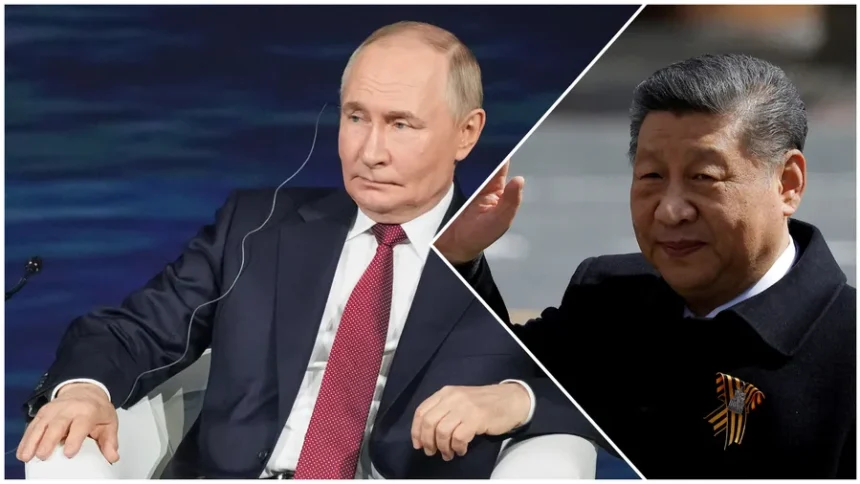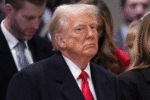China and Russia are strategically positioning themselves as voices of reason, calling for de-escalation in a conflict the United States is considering entering. This is the image Xi Jinping and Vladimir Putin sought to project during a phone call on Thursday, CNN reports.
As U.S. President Donald Trump weighs joining Israel in an attack on Iran, the rapidly escalating conflict between the two sworn Middle Eastern rivals has provided Beijing and Moscow with another opportunity to present themselves as alternatives to American power, according to CNN.
Condemnation of Israel and Implicit Message to “Great Powers”
In their discussion, Putin and Xi sharply condemned Israel’s actions, labeling them violations of the UN Charter and other norms of international law, according to the Kremlin. (CNN notes that Russia’s own violations of international law in its war against Ukraine, which Beijing consistently refuses to condemn, are conveniently overlooked.)
However, Beijing’s statement presented a more moderate tone, with Xi not explicitly condemning Israel—unlike his foreign minister, who did so in a conversation with his Iranian counterpart last week. Instead, the Chinese leader urged the warring parties, “especially Israel,” to cease fire as soon as possible to avoid further escalation and regional spillover.
Significantly, in a veiled message to Trump, Xi emphasized that “great powers” with special influence over the parties in conflict should work to “cool the situation, not the opposite.”
Chinese Analysts Criticize Trump’s Middle East Policy
Peking has long accused Washington of being a source of instability and tension in the Middle East. Some Chinese analysts are now using the Iranian crisis to underscore this point. Liu Zhongmin, a Middle East expert at Shanghai University of International Studies, attributed the latest escalation to the uncertainty created by Trump’s second term and the “chaotic, opportunistic, and transactional nature of his Middle East policy.”
“[Trump] has severely undermined the authority and credibility of U.S. policy in the Middle East, damaged American leadership and image among allies, while simultaneously weakening its ability to threaten and deter regional adversaries,” Liu wrote this week in state media.
Some Chinese online commentators have observed that it appears Trump is on the verge of drawing the U.S. deeper into yet another “eternal war” in the Middle East. At the start of his second term, officials close to Trump repeatedly stressed the need for Washington to redirect its focus and resources to counter Chinese ambitions in the Indo-Pacific. Yet, five months later, the wars in Ukraine and Gaza continue to rage, and Trump is now considering U.S. involvement in the Israeli-Iranian conflict.
China’s Strategic Interests and Mediation Ambitions
Peking has no interest in an all-out war against Iran, which could lead to regime collapse, CNN states. Under Supreme Leader Ayatollah Ali Khamenei, Iran has emerged as an imposing force in the Middle East and a vital counterweight to American dominance—just as China works to expand its own diplomatic and economic footprint in the region.
In 2023, Peking helped mediate a surprising rapprochement between sworn rivals Saudi Arabia and Iran—an agreement that signaled its ambition to emerge as a new mediator in the region. China has long supported Iran through continuous oil imports and its position in the UN Security Council. In recent years, the two countries have deepened their strategic ties, including holding joint naval exercises with Russia. Peking has welcomed Tehran into the Shanghai Cooperation Organization and BRICS—groups led by China and Russia to counter the U.S.-managed world order.
Iran is also a key node in China’s Belt and Road Initiative (BRI), its global infrastructure and investment movement. The country is located near the strategic port of Gwadar—a key BRI position in Pakistan that gives China access to the Indian Ocean—and borders the Strait of Hormuz, a vital chokepoint for Chinese oil imports from the Persian Gulf. Some analysts in the U.S. believe that the primary American interest in the region is to weaken China, its “Belt and Road” initiative, and connect the Red Sea to the Mediterranean through the proposed Ben Gurion route, which would also extend through Gaza.
Like Russia, China has offered to be a potential mediator in the Israeli-Iranian conflict, presenting its role as a peacemaker and an alternative to American leadership. During his talks with Putin, Xi put forward four proposals for de-escalating tensions, including resolving the Iranian nuclear issue through dialogue and protecting civilians, according to the Chinese statement. Meanwhile, Foreign Minister Wang Yi has spoken with his counterparts in Iran, Israel, Egypt, and Oman in a series of diplomatic contacts.
However, it remains unclear what Peking is willing and able to do when it comes to genuinely mediating the conflict. In the early stages of Israel’s war in Gaza, China made a similar offer and sent a special envoy to the region to promote peace talks—efforts that ultimately yielded few concrete results. Moreover, in the only conflict where China holds significant influence—the war in Ukraine—Xi has offered diplomatic protection and much-needed economic support to Putin, even as China continues to portray itself as a neutral peacemaker.
Nevertheless, at a time when American global leadership is under increasing scrutiny, particularly in the eyes of the Global South, portraying itself as a voice of restraint in the Iranian conflict may already count as a symbolic victory for Peking, CNN concludes.







